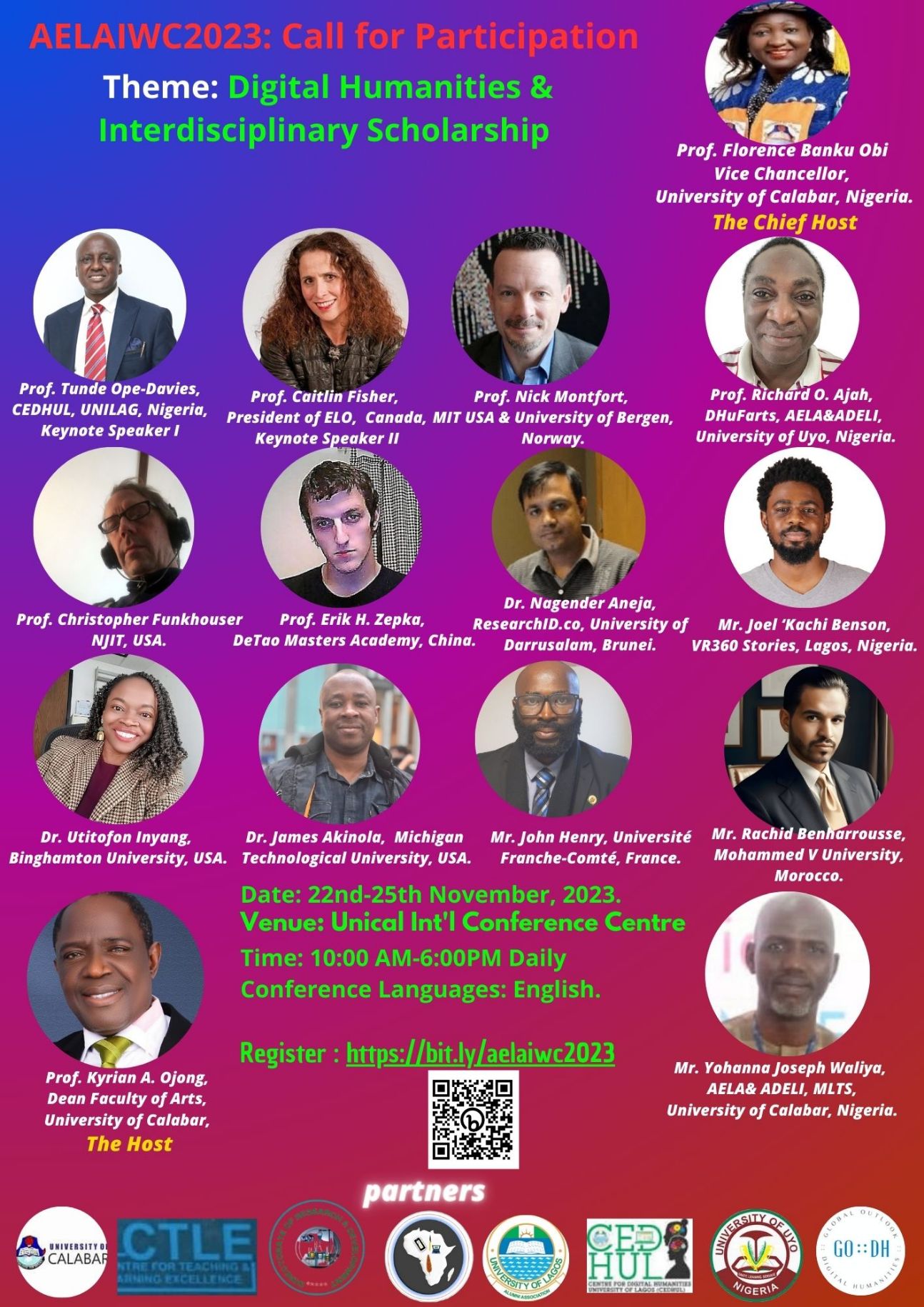
The 3rd African Electronic Literature Alliance International Workshop Conference (AELAIWC 2023, Calabar, Nigeria)
Call for Participation: The 3rd African Electronic Literature Alliance International Workshop Conference (AELAIWC2023)
The Faculty of Arts, University of Calabar, Calabar Nigeria in conjunction with African Electronic Literature Alliance & African Diasporic Electronic Alliance (AELA&ADELI) organises The 3rd African Electronic Literature Alliance International Workshop Conference (AELAIWC2023)
Theme: Digital Humanities & Interdisciplinary
Date: 22nd-25th November, 2023.
Venue: University of Calabar International Conference Centre
Time: 10:00 AM-6:00PM (WAT) Daily
Conference Languages: English.
Nature: Hybrid (onsite & offline)
AELAIWC2023 is the third annual conference of the African Electronic Literature Alliance and African Diasporic Electronic Literature (AELA & ADELI). It was initiated in 2021 by Mr. Yohanna Joseph Waliya from the University of Calabar, Nigeria in collaboration with Prof. Mourad El Fhali from Sidi Mohammed Ben Abdellah University, Morocco, Prof. Richard O. Ajah from the University of Uyo, Prof. Tunde Ope-Davies from the Centre for digital Humanities University of Lagos, and Prof. Abdelmoumin El Azouzi, also from Sidi Mohammed Ben Abdellah University, Fez, Morocco.
This year conference and workshop will digress from the normal African Electronic Literature to sensitise scholars and artists on the Digital Humanities and interdisciplinary scholarship.
Digital Humanities (DH) is the most recognised buzzword today in the multidisciplinary scholarship in the world that assembles disciplines such as arts, humanities, social sciences, computer science, new media studies, artificial intelligence, deep learning and machine learning. It builds on amplifying multisectoral methodologies and collaborations, harnessing digital infrastructures and tools into humanistic as well as artistic studies. In other words, DH employs computer, artificial intelligence (AI), deep leaning (DL), machine learning (ML), and recently Large Language Models (LLMs) as methods and tools for investigation in the arts and humanities.
The budding DH community in Africa has made frantic efforts through collaborations in the area of capacity building and sensitization of African scholars. Summer schools, conferences, sensitization workshops among others have been used to train African scholars in DH scholarship. CEDHUL-Centre for Digital Humanities University of Lagos’ Lagos Summer School in Digital Humanities (LSSDH), South African Center for Digital Language Resource (SADiLAR) and the newly established Institute of Digital Humanities in Francophone Africa (InHuNum-Af) in University of Yaoundé, the Digital Humanities Unit of the Faculty of Arts (DHuFArts),University of Uyo, and African Electronic Literature Alliance and African Diasporic Electronic Literature (AELA & ADELI) have made great efforts recently in Africa to close the gap in the application of computational turn for research and development in the arts and humanities through provisions of the capacity building opportunities.
Despite impressive moves from these capacity building initiatives, DH scholarship is not receiving institutional supports from many African universities and consequently, many humanities and arts scholars are cut off from exposures to digital humanities scholarship and its enormous benefits to individual scholars and institutions.
To fill this gap, the Faculty of Arts, University of Calabar, in collaboration with the African Electronic Literature Alliance and African Diasporic Electronic Literature (AELA & ADELI), partnering with the Centre for Digital Humanities University of Lagos (CEDHUL), the Digital Humanities Unit of the Faculty of Arts (DHuFArts), University of Uyo, FAHSANU, CTLE, DORD, University of Calabar organizes a four-day training workshop and conference for national and international scholars thematised “Digital Humanities and Interdisciplinary Scholarship”. This year’s theme is crafted to foster inclusivity, heterogeneity and participation. The workshop/conference will be hybrid and multilingual as usual.
Objectives of the training workshop/Conference:
Introducing the participants to digital humanities scholarship.
Expose all participants to digital research methods and tools.
Present opportunities and potentials of collaborative research with DH experts.
Prepare the Faculty for the mounting of DH-related courses in the new CCMAS.
Networking the participants with global scholars.
How to participate
Fill in the form on our website. Make sure you indicate your area of research interest before proceeding to the payment of N 20, 000 ($50) for Conference attendance.
Click to register and pay for AELAIWC2023: https://bit.ly/aelaiwc2023
Materials: You need to bring your laptops and power cable for practical sessions.
This conference is made for workshops, lectures and trainings only not paper presentation by the participants.
NB: If you want to publish what you’ve learned at the conference later, please consider sending it to Multilingual African digital Semiotics & E-lit Journal (MADSEJ): https://madsej.africanelit.org
For AELA & ADELI membership: https://africanelit.org/membership.php
Register here for Digital Humanities Association of Nigeria Membership: https://dhnigeria.org/registration/
List of Resource Persons and the Lectures/Workshops
The opportunities in Digital Humanities for African Scholars-Prof. Dr. Tunde Ope-Davies, CEDHUL, University of Lagos (Keynote Speaker I) African Electronic Literature on Immersive Platforms techniques and practices for Africans- Prof. Caitlin Fisher, President of Electronic Literature Organization, York University, Canada (Keynote Speaker II) Intersectionality of African literature and technology - Prof. Richard O. Ajah, DHuFarts, AELA & ADELI, University of Uyo, Uyo, Nigeria. Generative Text’s Global History-Prof. Nick Montfort, Institute of Technology & the Center for Digital Media, University of Bergen Exploring the history of digital poetry from 1950 to Augmented Reality Poetry - Prof. Christopher Funkhouser, New Jersey Institute of Technology, USA. Digital Characters and objects simulation for storytelling in Digital Humanities. Prof. Erik H. Zepka, DeTao Masters Academy, China Digital Humanities in the Classroom: Teaching & Learning with Omeka -Prof. Bekeh Ukelina State University of New York, USA. Text Encoding and Artificial Intelligence for detecting handwriting -Dr. Nagender Aneja, The Founder of RersearchID, University of Darussalam, Brunei. Programming immersive storytelling and 360° video camera demos for metaverse, Ben Kachi, vr360 Stories, Lagos, Nigeria. Easy-to-use Digital Humanities tools-Dr. James Akinola, Technological University of Michigan, USA. Introduction to Digital Humanities- Dr, Utitofon Inyang, Binghamton University, NewYork, USA. Geospatial analysis and Digital Humanities-Mr. John Henry, Université Franche-Comté, France. Towards A "Political Turn": Exploring Creative Digital Narratives for Political Activism- Dr. Rachid Benharrousse, Mohammed V University, Morocco. Research Methodologies in Digital Humanities- Go::DH Team. Critical Code Studies and Non-coder approach to creation of African electronic literature - Mr. Yohanna Joseph Waliya, AELA & ADELI, University of Calabar, Calabar, Nigeria.